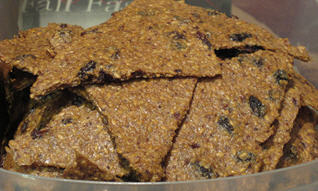The New Facts about FLAX
The almighty flaxseeds. Thanks to their much-hyped health benefits, you can find these seeds everywhere from walnut truffles and tortilla chips to breads and oatmeal.

But according to some new research on linum usitatissimum (flaxseed), if you’ve been consuming flaxseeds or flaxseed oil to help ease hot flash symptoms, you might be boiling mad about how much you’ve spent unnecessarily on fancy flaxseed- infused products.
“We did not see a benefit from flaxseeds in reducing hot flashes”, says Sandhya Pruthi, MD, a physician and expert in breast health. “It was really quite a shock”.
Previously, Dr. Pruthi and her team of researchers found that flaxseeds could reduce hot flashes by 57%, on average. In that study, published in the summer 2007 issue of The Journal of the Society for Integrative Oncology, 30 women took 40 grams of crushed flaxseeds daily for six weeks and recorded their hot flashes in a dairy. The mean reduction in hot flash frequency was 7.3 to 3.6 per day. “It was quite impressive”, recalls Dr. Pruthi of the flaxseeds’ performance. “Not only with the hot flashes but also with their quality of life”. The findings bolstered those of a 2006 study published in The Journal of the North American Menopause Society, in which omen reported less severe hot flashes after eating muffins made with ground flaxseeds.
But Dr. Pruthi’s initial study didn’t use a placebo group, and when the researchers followed up with both flaxseed bars containing lignans and fiber and placebo protein and fiber bars, the results were disappointing. One hundred and eighty-eight postmenopausal women took part in the second study; they reported having at least 28 hot flashes per week. One group consumed a bar containing 410 milligrams of the flaxseed-derived phytoestrogen lignans; the other took the placebo. The hot flash scores dropped by 4.9 units in the flaxseed group and 3.5 units in the placebo group.
“There was really no difference when it came to comparing”, says Dr. Pruthi. “I was quite surprised – here we thought this would be a great way to treat hot flashes, and this came out we realized that our finds did not support he use of flaxseed lignans for the reduction of hot flashes”.
Study participants also reported nausea, bloating and other unpleasant side effects, but those effects were felt by both the flaxseed and the placebo groups and were probably from the extra fiber, says Dr. Pruthi.
So what does the study mean for the future of flaxseeds and flaxseed oil? There are still many good reasons to take such supplements, say experts. First, it may reduce some risk factors of cardiovascular disease, according to a study published in the February 2008 issue of the Journal of the American College of Nutrition. That study included both men and women between the ages of 44 and 75, and found that those who consume 40 daily grams (about 1.4 ounces) of whole yellow omega ground flaxseeds added to baked products had better insulin sensitivity and reduced levels of lipoprotein (a) than those who had consumed products made with durum wheat bran. Lipoprotein (a) is considered a possible risk factor in the development of heart disease.
Flaxseeds have also been shown to be an effective laxative thanks to the fact that they contain soluble fiber. “It’s a well-tolerated supplement when needed for efficient digestion”, says Dr. Pruthi.
So if you’re looking to get things moving, you should start taking flaxseeds or consider trying the supplement. Use ground flaxseeds, which are better-absorbed by the body, and try one tablespoon a day for a couple of weeks to see how your body tolerates them, suggests Dr. Pruthi. Eventually, you can increase your intake to two tablespoons per day.
But if you’re looking to cool the hot flashes and don’t’ want to risk the abdominal discomfort that flaxseeds can cause, you may want to look elsewhere.
The National Center for Complementary and Alternative Medicine also reminds you to take flaxseed with plenty of water; otherwise, you may find yourself a little “bound up”. Keep in mind that flaxseeds’ fiber may also interfere with the absorption of certain oral medications, so be sure to consult with a physician and take flaxseeds on their own if you are taking any other drugs or supplements.
Source: CleanEatingMag

